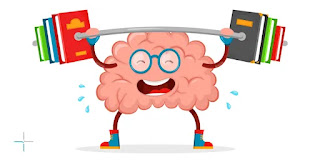14 Ways to Help Improve Your Memory
14 Ways to Help Improve Your Memory - Not being able to recall information when you want is always irritating. There are a lot of tricks you can use to memorize things and even unlock memories you thought were lost. By using these tips, you will learn to memorize more completely and remember more easily.
If you're looking for a way to remember things, writing them down is easy and effective. This will help create blood flow toward the parts of the brain that help you remember things. If you write detailed lists or keep a diary, you can increase your short-term memory abilities.
You might find mnemonic devices useful in retaining and recalling some memories. Mnemonic devices aid the memory in a fashion similar to how shorthand helps writers. You relate an idea with something common, giving you an easy way to remember it.
Just like your muscles, you must use your brain to keep it in good shape. A number of research studies demonstrate that playing puzzles and games keeps the brain functioning well as old age sets in.
If you're looking for a memory boost, try working out! Exercise increases blood flow and the delivery of oxygen to all parts of your body, including the brain. Basically, everything that benefits your overall health will also benefit your brain's memory function. One advantage exercise has in terms of memory is that it helps ward off diseases that often adversely affect cognitive function.
Work on getting adequate amounts of sleep. Sleep actually plays a crucial role in your ability to remember things in both the long and short terms. You are going to have a difficult time remembering things if you are tired. Try to get plenty of rest to help you retain memory.
To improve your memory when you are studying, you should change the environment where you studying. Switching up your surroundings can actually rejuvenate your brain cells, and increase memory in the longer term. You will jog your brain awake once it notices your location change, and once awake, your brain will be able to more effectively process information into memories.
Social activity can go a long way in keeping the vigor in your memory. Your spirits will say up and alert. Your brain cells will not get stimulated when you are feeling lonely or depressed. However, if you engage in interesting conversation with others, your mind will remain sharp, as will your memory.
If there is something you must recall at a later time, attempt to associate the thought with a funny phrase, melody or visual imagery. Utilizing humorous elements in order to enliven the information will help you remember it down the road.
Improved memory is just one of the many benefits of regular exercise. Even a small amount of daily exercise can be very helpful.
Imparting memories to other people can actually help you to remember them yourself. Talk to as many people as possible about any event you want to remember. The more people you tell a story to, the easier it will be for you to remember. This also allows you to properly encode the memory into your brain, making it much easier to call upon when needed.
Even if you're not currently in college or school, take time to learn some new things. If you do not acquire new knowledge, the memory-storing part of your brain isn't stimulated. And if you don't stimulate your memory often, you could find the next time you really need it to work, it won't.
Try not to doubt yourself. Some people just assume that memory decline is an inevitable fact of aging. That isn't necessarily true. Expecting memory deterioration could potentially damage your memory. When people begin to doubt your mental acuity, it becomes easier to believe that about yourself. Simply extending the belief that you still have a strong memory can short-circuit this phenomenon.
One way to boost your memory is relate the things you want to remember with information you already know. By associating your new information in short term memory to already acquired information in long term memory, you give it an anchor and help it to become embedded in your brain.
When studying important information that you need to memorize, make sure that you keep your entire concentration on the topic you are studying. Humans need to store information in their long-term memory before they can easily remember it. It is hard for people to move information into their long-term memories, because of the surrounding the distractions.
It was stated that these tips would help you to recall the information that is in your memory when you need it. Hopefully these tips will help you to find the way to do just that. It will make things in your life much easier and less frustrating than it was when you forgot it all.








